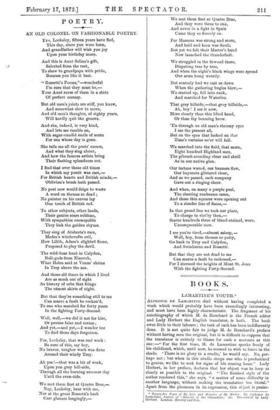POETRY.
AN OLD COLONEL ON FASHIONABLE POETRY.
YES, Locksley, fifteen years have fled, This day, since you were born, And grandfather will wish you joy Upon your birthday morn.
And this is Aunt Selina's gift, Selected from the rest, To show to grandpapa with pride, Because you like it best.
41 Rossetti's Poems,"—wonderf al I'm sure that they must be,— Your Aunt raves of them in a state
Of perfect ecstasy.
Ent old men's joints are stiff, you know, And somewhat slow to move, And old men's thoughts, of eighty years, Will hardly quit the groove.
And she, indeed, is very kind, And lets me ramble on, With sugar-candid smile of scorn For one whose day is gone.
Zhe tells me all the poets' names, And what they sing about, And how the famous artists bring Their flashing splendours out.
I find that over those old times
In whioh my youth was cast,— For British hearts and British minds,—
Oblivion's brush hath passed.
No poet now would deign to waste A word on themes so dead ; No painter on his canvas lay One touch of British red.
To other subjects, other lands, Their genius soars sublime, With sympathies cosmopolite They link the golden rhyme.
They sing of Atalanta's race, Medea's witchcrafts evil, How Lilith, Adam's slighted flame, Proposed to play the devil.
The wild-boar hunt in Calydon, Bull-gods from Nineveh, What Helen said at Venus' shrine In Troy above the sea.
And those old times in which I lived Are as much out of sight As history of orbs that fringe The utmost skirts of night.
But that they're something still to me
Can scarce a fault be reckon'd, To one who marched for forty years
In the fighting Forty-Second.
Well, well,—we did it not for hire, Or praises false and rotten ; And yet,—and yet,—I wonder too To find those days forgotten.
For, Locksley, that was real work : Be sure of this, my boy, No braver, tougher work was done Around their windy Troy.
Ah yes !—that was a bit of work, Upon yon grey hill-side, Through all the burning summer day Until the even-tide.
We met them first at Quatre Bras,—
Nay, Locksley, bear with me, 'Nor at the great Rossetti's book Cast glances longingly,— We met them first at Quatre Bras, And they were three to one, And never in a fight in Spain Came they so fiercely on.
For Massena was strong and stern, And bold and keen was Soult, But yet we felt their Master's hand Now launched the thunderbolt.
We struggled in the firwood there, Disputing tree by tree, And when the night's black wings were spread Our arms hung wearily.
But scarcely had we cast us down
When the gathering bugles blew,—
We started up, fell into rank, And marched for Waterloo.
That grey hillside,—that grey hillside,— Ah, boy! I see it now, More clearly than this lifted hand, Or than thy beaming brow.
'Tis through an old man's rheumy eyes I see the present all,
But on the eyes that looked on that Time's curtains ne'er will fall.
We marched into the field, that morn, Eight hundred Highland men, The pibroch sounding olear and shrill As in our native glen.
Our tartans waved, our banners flew, Our bayonets glittered clear, And as we passed, each company Gave out a ringing cheer.
And when, on many a purple pool, The slanting sunbeams came, And those thin squares were opening out
To a slender line of flame,—
In that proud line we took our place,
To charge to vict'ry then,—
Scarce hundreds three of blood-stained, worn, Unconquerable men.
I see you're tired,—almost asleep, - Well, boy, from themes so petty, Go back to Troy and Calydon, And Swinburne and Rossetti.
But that they are not dead to me Can scarce a fault be reckoned,—
For I stormed the heights of Mont St. Jean With the fighting Forty-Second.


































 Previous page
Previous page